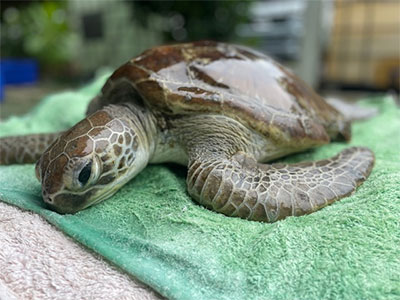Rescued Green Sea Turtle from Emily Bay - Update on condition and prognosis – and thank you
04 November 2022

Parks Australia is pleased to report the sick juvenile green sea turtle ‘Doris’ has greatly improved in condition and prognosis in the past two weeks thanks to the outstanding care and treatment provided by Parks personnel together with the Norfolk Island veterinarian, volunteers, and community.
Monday 8 November 2022 will mark eight weeks since Doris was retrieved by Norfolk Island National Park Manager Nigel Greenup, Norfolk Marine Park Officer Hannah Taylor, and Norfolk Island citizen scientist Susan Prior. Thank you to the many community members for reporting observations of the turtle’s declining health.
The difference between Doris’s condition now and the extremely poor condition and low likelihood of survival upon her rescue on 12 September shows significant improvement. The turtle’s natural behaviours are now returning to normal.
Thank you to those who have kept the community informed of progress while we have concentrated on the care and treatment of the turtle. Doris will continue to receive veterinary treatment and rehabilitation care and is now considered a good candidate for release back into Norfolk Marine Park.
Parks Australia contracted a specialist vet to travel to Norfolk Island and assess the turtle’s health and work with the local vet to undertake any required veterinary procedures and administer treatments. Both he and the Cairns Turtle Rehabilitation Centre also continue to provide advice to us and Norfolk’s local veterinarian.
Many thanks to Norfolk Island National Park staff, volunteers and Island vet who have been going above and beyond to assist with the turtle’s needs, care and treatment, contributing much of their personal time and resources. Thank you also to the community members and businesses who have donated fish and fish off-cuts and other critical resources and to those who have helped obtain and transport items urgently needed from Australia to Norfolk Island.
About sea turtles
Green sea turtles (Chelonia mydas) are listed as endangered by the International Union for Conservation of Nature (IUCN) Red List and vulnerable under the Environment Protection and Biodiversity Conservation Act (EPBC Act). Other sea turtle species regularly found within Norfolk Marine Park include hawksbill turtles (Eretmochelys imbricta) which are listed as critically endangered by the IUCN and vulnerable under the EPBC Act.
Scientists describe sea turtles as a keystone species in recognition of the critical roles they play in supporting ecosystem function and balance. All marine turtle species are experiencing serious threats to their survival. The main threats to sea turtles are marine pollution and changes to important turtle habitats, including coral reefs.
Green sea turtles are considered high risk from the impacts of poor water quality. Reduced water quality resulting from pollutants including sediment entering the marine environment have the potential to affect marine sea turtles’ health directly and reduce the viability of habitats necessary for survival.
One of the issues impacting the health of Norfolk Island’s coral reef ecosystem and environment, is catchment runoff. This has been compounded by recent stormwater events. Norfolk Island is currently experiencing its wettest year on record which has resulted in regular large pulses of stormwater entering the marine environment together with increased volume and frequency of surface-water runoff and groundwater discharge.
Reef health research
As noted in previous Norfolk Marine Park Updates, Parks Australia has contracted Sydney Institute of Marine Science in collaboration with the University of New South Wales, James Cook University, and the University of Newcastle to assess the health of Emily and Slaughter Bay lagoon including coral disease and algal growth, in recognition of longstanding water quality concerns.
The research team have found that algal blooms in the water column, increased algal growth and coral diseases are all problems caused directly by contaminated water entering the lagoon.
Findings from the September lagoon reef health surveys will be made available in a future Norfolk Marine Park Community Update, along with information about how the community can contribute to reef health monitoring.
The Norfolk Marine Park team can be contacted on Norfolk.Marine.Park@environment.gov.au
Marine Park Project Officer Hannah Taylor can be contacted on phone 22695 (Norfolk Island National Park Office) or mobile 51522